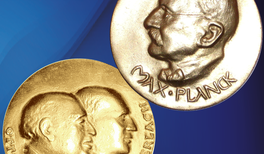Preisträgervorträge
Mit ihren Preisen würdigt die DPG in besonderer Weise herausragende wissenschaftliche Leistungen auf dem Gebiet der Physik. Nachfolgende Preisträger halten ihre Preisträgervorträge im Rahmen eines Symposiums auf der DPG-Frühjahrstagung in Bonn:
Donnerstag, 13. März 2025, 14:30 - 15:10 Uhr, HS 1+2
Reinhard Werner, Leibniz Universität Hannover, Deutschland
Max-Planck-Medaille 2025
spricht über
"A journey in mathematical quantum physics"
Abstract:
I will recount some aspects of the early history of quantum information science and its development from an exotic specialty to a major branch of physics. In a field that set out to turn ``paradoxes into products'' mathematical reasoning was a necessary boost for physical intuition, so that the mathematical physics branch of the community was always well appreciated. This offers an opportunity to compare with the role of mathematics in the early history of quantum mechanics in its centennial year.
Donnerstag, 13. März 2025, 15:10 - 15:50 Uhr, HS 1+2
Klaus Blaum, Max-Planck-Institut für Kernphysik, Heidelberg, Deutschland
Stern-Gerlach-Medaille 2025
spricht über
"Precision Tests of the Standard Model at Low Energies Using Stored Exotic Ions in Penning Traps"
Abstract:
The four fundamental interactions and their symmetries, along with the fundamental constants and properties of elementary particles – such as masses and magnetic moments – form the foundational structure of the universe and underpin the well-tested Standard Model (SM) of particle physics. Conducting stringent tests of these interactions and symmetries under extreme conditions, at low energies and with the highest precision, for example by comparing particles and their counterparts, the antiparticles, allows us to probe for potential physics beyond the SM. Advancing these tests beyond their current limits requires the development of innovative experimental techniques.
This overview highlights recent technical advancements and measurements of atomic and nuclear masses, as well as g-factors, with unprecedented precision, performed on individual or a few cooled exotic ions stored in Penning traps. Notably, these experiments have among others enabled the most precise tests of bound-state quantum electrodynamics and have significantly improved the accuracy of several key fundamental constants.
Donnerstag, 13. März 2025, 15:50 - 16:30 Uhr, HS 1+2
Michael Fleischhauer, Rheinland-Pfälzische Technische Universität Kaiserslautern-Landau, Deutschland
Herbert-Walther-Preis 2025
spricht über
"Controlling light by atoms and atoms by light: from dark-state polaritons to many-body spin physics"
Abstract:
Tailored driving of multi-level atoms with laser light can form quantum oscillators with extraordinary properties, allowing e.g. to create lossless media with full control on photon propagation or spin ensembles with long-range dipole-dipole interactions. In the first part of the talk I will review the concept of dark-state polaritons emerging from hybridizing light with driven atomic dipoles. I will discuss its application to control light propagation, to build quantum memories for photons, and to create strong photon-photon interactions using Rydberg states of atoms. Due to their strong and long-range interaction, driven Rydberg atoms have become a versatile platform of their own to study the many-body dynamics of quantum spin systems, both in unitary and dissipative settings. In the second part of the talk I will examine the equilibrium and non-equilibrium physics of various such (open) spin models using driven Rydberg atoms. This ranges from the facilitation dynamics of Rydberg excitations in a gas, resembling epidemic models with an absorbing-state phase transition on a dynamical network, to the creation of topological spin liquids due to density-dependent transport processes associated with a gauge field, emerging from driving multiple Rydberg states.


